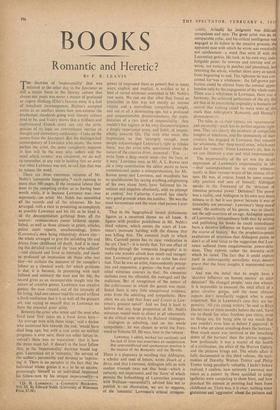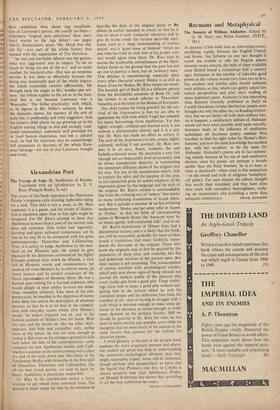BOOKS
Romantic and Heretic?
BY F. R. LEAVIS
THE doctrine of 'impersonality' that was referred to the other day in the Spectator as still a major force in the literary culture that shapes our poets was never a matter of profound or cogent thinking (Eliot's famous essay is a feat of trenchant inconsequence, Hulme's accepted status as an intellect shows how non-existent the intellectual standards going with literary culture tend to be, and Valery shows that a brilliant and sophisticated French mind can rest the strin- gencies of its logic on conventional inertias of thought and elementary confusions—I take up the names from the Spectator). But the distinguished contemporary of Lawrence who wrote, `the more perfect the artist, the more completely separate in him will, be the man who suffers and the mind which creates,' yvas consistent, we do well to remember, at any rate in holding that an artist was what Lawrence was not; to call him that, was to misuse the word.
There are three enormous volumes of Mr. Nehls's 'composite biography,'* each running to more than 500 pages, If the immense labour that went to the compiling, strikes us as having been worth while, it is because Lawrence was—was supremely--an artist. Mr. Nehls has assembled all the records and all the witnesses. He has arranged, with a view to presenting as completely as possible Lawrence and his life as he lived it, all the documentation gathered from all the sources: reminiscences (some hitherto unpub- lished, as well as those already in print), articles, police court reports, smuthoundings, letters (Lawrence's .own being extensively drawn on)— the whole arranged to give the unfolding life and drama from childhood till death. And if in read- ing this detailed record of the 'man who suffered' —and enjoyed and lived so intensely, and made so profound an impression oh those who met him—we acclaim the outcome of the compiler's labour as a classical work, for which gratitude is due, it is because, in presenting with such fullness and intimacy the man and the life, the record gives us an incomparable insight into the nature of creative genius. Lawrence was creative genius; the man created, out of the intensity of his living. And one cannot read the record without a fresh realisation that it is so with all the greatest art, and saying to oneself that in Lawrence we have the essential great artist.
Between the artist who wrote and the man who lived (and 'live' takes on a fresh force here— 'An average man with those lungs,' said a doctor who examined him towards the end, `would have died long ago; but with a real artist no normal prognosis is ever sure; there are other forces in- volved') there was no separation that is how the stress must fall. It doesn't in the least follow that, as the 'impersonality' doctrine would sug- gest, Laurentian art is `romantic,' the servant of the author's personality and devoted to 'express- ing' it. There is no paradox in the fact that the individual whose genius it wus to be so uncom- promisingly himself as an individual impressed his fellow-men by his unique impersonality—a *D. H. LAWRENCE: A COMPOSITE BIOGRAPHY, Vol. 111. By Edward Nehis. (University of Wisconsin Press, $7.50.) power (it impressed them as power) that in many ways, explicit and implicit, is testified to by a host of varied witnesses assembled in Mr. Nehls's vast work._ We can see that what they found so irresistible in him was not merely an intense vitality and a marvellous sympathetic insight, and not at all a dominating ego, but a profound and unquestionable disinterestedness, the mani- festation of a rare kind of responsibility : they couldn't but register in his very disconcertingness a deeply impersonal sense, and habit, of respon- sibility towards life. The man who made this impression, so that 'strangely enough, most people acknowledged Lawrence's right to rebuke them,' was the artist who, questioned about the nature of the creative drive, answered : 'You . . . write from a deep moral sense—for the race, as it were.' Lawrence may, as Mr. A. L. Rowse says (in a long contribution the editor seems to have commissioned under a misapprehension, for Mr. Rowse never , met Lawrence, and manifestly has no qualifications for saying anything enlightening of his own about him), have 'followed his in- tuitions and impulses absolutely, with no attempt at control,' but Catherine Carswell has clearly very good grounds when she testifies: 'He was the most harmonious and the most vital person I ever met.'
That in the biographical record disharmony figures as a -recurrent theme we all know. It figures with peculiar painfulness in Mr. Nehls's third volume, which covers the years of Law- rence's incessant battling with the disease that was killing him. The essential truth to which Mrs. Carswell points has its clear vindication in the art. Clear?—it is surely that. Yet one effect of reading through the `composite biography' is to make one wonder afresh how much real recogni- tion Lawrence's greatness as an artist has ever had. That he was an artist, transcendently percep- tive and responsive, a genius—the host of aston- ished' witnesses concurs in. that; the consensus includes even the offended, the outraged and the malicious. But of recognition of • the nature of the achievement in which the genius was mani- fested there is very little unequivocal evidence, even from the admiring and sympathetic. How often we are told that Sons and Lovers is Law- rence's greatest novel! And we find it hard to belinve that any large proportion of Mr. Nehl's witnesses would want to object at all vehemently to the critical note struck by Richard Aldington.
Aldington is admiring, and on the whole sympathetic : he was chosen to write the Fore- word to Volume III. He says, later in the volume :
Lawrence, I admit, worked too carelessly and his lack of form was sometimes an exasperation.
But unpremeditated and spontaneous creation is
the essence of the Romantic and the Heretic. There is a piquancy in recalling that Aldington, a scholar and man of letters, wrote Death of a Hero, and that Lawrence, Aldington tells us with modest triumph (was not that book—which is certainly not impersonal, and the 'form' of which permits the hobnobbing of Laurentian passages with Wellsian—successful?), advised him not to publish it—an illustration, we are to suppose, of the 'romantic' Lawrence's critical irrespon- sloility. Actually his judgment was delicat scrupulous and sure. The great artist was an in, comparable critic, and his critical intelligence wal engaged at its fullest in the creative process; the apparent ease with which he wrote was essentially not carelessness—a word that sorts ill with the Laurentian genius. He took, in his own way, inde- fatigable pains; he rewrote and rewrote and re- wrote, not revising in patches and piecemeal, but rewriting the whole, whether short story or novel, from beginning to end. The rightness he was con- cerned for-was a wholeness: the full-grown per- fection could be elicited from the seminal appre- hension only by the engagement of the whole man. There was a wholeness in Lawrence, there was a harmony; the achieved perfections of the art, the art that in its astonishing originality is humanly so central (for nothing could be more wide of the mark than Aldington's `Romantic and Heretic'), demonstrate th:' The tales, in all their variety, arc 'spontaneous and inevitable--each has its perfect organic right- ness. They are clearly the products of compelling insights or intuitions, and the spontaneity of their creation has engaged in Lawrence that concern for wholeness, that 'deep moral sense,' which may stand for `control.' From Lawrence's art, that is, we can illustrate a true and vital impersonality.
The impersonality of the art was the direct expression of Lawrence's impersonality in life —that accompaniment (as so many witnesses testify in their various ways) of his intense alive- ness. He was, of course, found by some censor- ably positive and sure of himself; Aldington speaks in the Foreword of the `delusion of immense personal power.' Delusion? The power was a reality, and Aldington in his own way bears witness to it; but it was power because it was so irresistibly not personal: Lawrence's 'deep moral sense,' the authority of his genius, was so clearly not the self-assertion of an ego. Aldington speaks of Lawrence's !extraordinary faith that by writing and publishing his books he could immediately have a decisive influence on human society and the course of history.' But the prophetico-poctic exaltations of utterance that Aldington points to don't at all lend force to the suggestion that Law- rence suffered from megalomaniac power-delu- sions. They express rather the intensity with which he cared. The fact that it could express itself in extravagantly unrealistic ways doesn't prove that the basic insights it represented 'were invalid.
And was the belief that he might have a `decisive influence on human society' an utter delusion? 'He changed people,' says one witness. It is impossible to measure the total effect of a great creative genius, and the most obvious aspects don't necessarily suggest what is most important. But in Lawrence's case they arc MI- 'pressive. 'All you young writers,' he said to Rhys Davies two or three months before the end, 'have me to thank for what freedom you enjoy, even as things are, for being able to say much that you couldn't even hint at before I appeared. It was I who set about smashing down the barriers.' How much more was involved in the 'smashing down of the harriers' than the phrase suggests, how profoundly it was a matter of the health of a civilisation, the affair of the Warren Gallery and the pictures brings out. The whole affair is fully documented in this third volume, the testi- monies of Dorothy Warren Trotter and Philip Trotter being peculiarly valuable. I hadn't before realised, I confess, how seriously Lawrence was taken as a painter by those qualified to judge (galleries were competing to show him), and how practical his interest in painting had been from childhood on. There was, it is clear, nothing more gratuitous and 'aggressive' about the pictures and
their exhibition than about any manifesta- tion of Lawrence's genius; the assault on them— informers, 'virginal, pure policemen' (how one's heart warms to the Aga Khan!—see pages 344-5), denunciatory press, 'Mr. Mead that old, old lily'—was part of the whole history that opened with the suppression of The Rainbow.
The real and inevitable offence was the genius; what was 'aggressive' was its impact. To do so much to 'bring sex out of the w.c.' and to make another Jix inconceivable—that was an immense service. It was done so effectively because the doing was inseparably part of the whole impact, the whole irresistible creative affirmation. 'He brought back the magic to life,' testifies one man. And the tribute applies to the art as to the man. And this is not because Lawrence was a 'Romantic.' The blithe practicality with which, as he figures in Mr. Nehls's volumes, he does the domestic chores, his mastery of the arts of daily life, is profoundly and truly suggestive. And the miner's child whom we see growing up in the English mining village (a real and strongly tradi- tional community), supremely well provided for in lived human experience, was not a cultural waif; he had his initiation into an astonishingly full possession (it became) of the whole Euro- pean heritage—for out of that Lawrence thought and wrote.







































 Previous page
Previous page